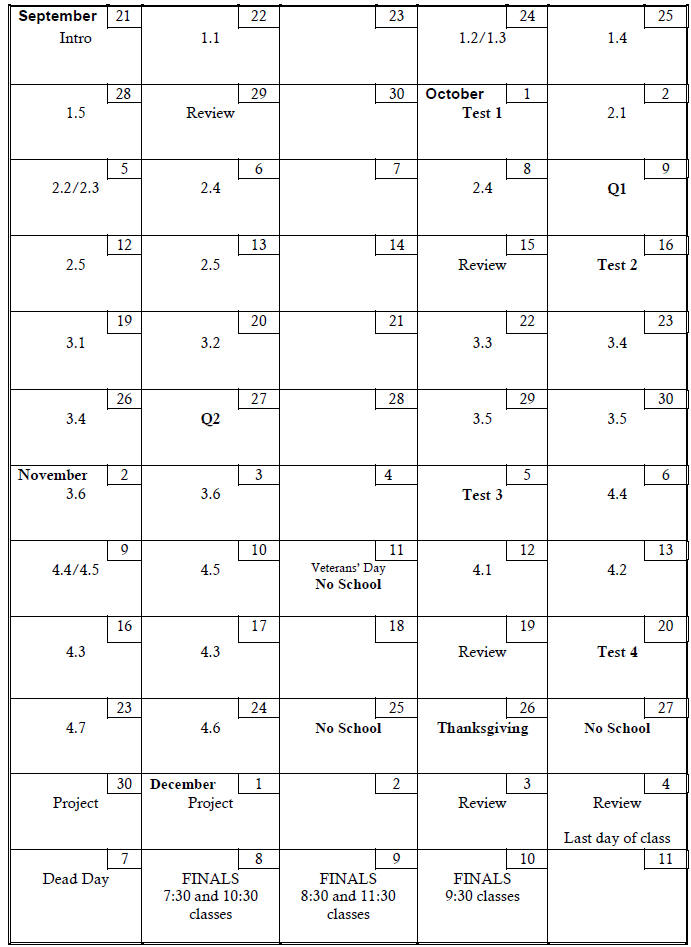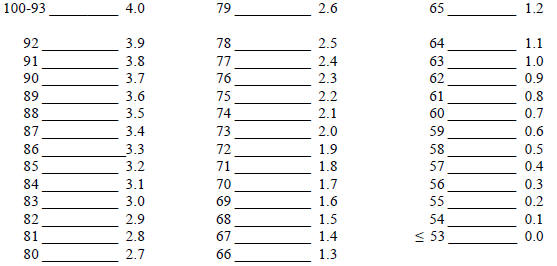Elementary Algebra I
The following syllabus outlines class expectations,
policies, and a tentative schedule. Please
read it carefully, ask questions, and keep it available for your reference
during the quarter.
|
RATIONALE :
|
This course is the first in a three-course algebra sequence (93, 94, and
98). These courses are designed for students who have not had a high school algebra course or who need to review the basics of algebra. |
||||||||||||||||||
|
OVERVIEW:
|
Topics discussed will include but is not limited to modeling with
quadratic functions , solving quadratic equations , problem solving, statistics, quadratic regression, and powers and roots . If you have not met the prerequisites for this course you will be dropped from the course. Please contact your instructor immediately if you have questions concerning the prerequisites. |
||||||||||||||||||
|
REQUIRED MATERIALS:
|
Please bring the REQUIRED MATERIALS listed below with you to every class meeting. Text: - ESSENTIAL ALGEBRA:A
PRELIMINARY EDITION FOR SPOKANE FALLS COMMUNITY |
||||||||||||||||||
| EXPECTATIONS: |
One of the purposes of this course is to assist you in becoming a better
student. The first step towards your achievement of this goal is to follow some basic premises: Be in class every day – To be successful, you must be an active participant in class. It is your responsibility to let me know if you are going to be gone, to get caught up on what was missed, and to be prepared for the next class session. Be respectful – Be a positive member of the class by helping to create a good learning environment for everyone. Come to class on time and prepared and stay through its entirety. Leave cell phones, pagers, PDAs, iPods, etc. turned off during class time. Use common courtesies when others are asking questions, giving responses, or making presentations. For learning to take place, students must feel safe; this safety is due all students, not only those who share your values and beliefs. For this reason, courtesy, thoughtfulness, and acceptance are essential in our discussions in and out of the classroom. Acceptance should not be confused with agreement; one need not agree with a person to listen, and one must listen well in order to disagree respectfully. Every student in this course has a voice and so deserves the courtesy of attentive listening and the freedom to express diverse ideas. Be proactive: - Come to class prepared. Have your required materials, pre-class preparation complete, and assigned work and questions ready every day when you come to class. Be sure to ask questions when you don’t understand. There are always others in the room with the same question. Always get help at the earliest possible time. Putting it off only magnifies the problem. Give your best effort and do high quality work. This gives you the best opportunity to learn and to be successful and me an opportunity to see what it is that I must clarify. Be a positive group member : - Much of the work you do in class will be done in groups. For these groups to be effective in helping you gain a better understanding of mathematics you must be willing to participate in the group. Each person brings their own unique perspective from which the others in the group can learn. Be willing to share your insights and to help others within the group understand your perspective. Through this sharing of ideas everyone can come away with at more clear understanding of the mathematics presented. |
||||||||||||||||||
| COURSEWORK: |
As a general rule thumb , for you to be successful in a college course
you should plan on spending a minimum of two hours outside of class for every hour spent in class. This time is used for pre-class preparation, homework, projects, studying, reading, and preparing for presentations and exams. Points in this course are earned though Pre-Class Preparation, Homework, Projects, Quizzes, Exams, and a Final Exam. PRE-CLASS PREPARATION: Students are most successful when they come to class prepared to discuss and question material in a meaningful way. This means that you must prepare prior to coming to class for upcoming topics. For this course you will be assigned preparation work on the section to be covered the following day. This work might include vocabulary lists, study guides for the assigned reading such as outlines or concept maps, problems assigned as preparation work and discussions questions. Mini quizzes will be given and you may use your notes.
HOMEWORK: Homework will be assigned and
selected Model Problems will be QUIZZES: Quizzes will be given periodically
throughout the course. These are intended |
||||||||||||||||||
|
GRADES:
|
GRADE WEIGHTS:
You will be informed of your current grade after each exam. As a general rule, “Z” grades are not given. The following scale will be used to assign grades for the quarter
|
||||||||||||||||||
|
DEADLINES:
|
If you need to make schedule changes, you should refer to the deadlines
listed below. These changes can be made through the Registrar until 4:30 PM on the dates listed. September 25 – Last day to receive a 100% refund if officially withdrawn from classes October 2 – Last day to drop classes and prevent a “W” grade – Last day to add classes November 9 – Last day to drop a class, withdraw, or make and schedule adjustments |
||||||||||||||||||
|
DISABILITY INFO:
|
If you have a health condition or disability that might require
accommodations in order for you to fully participate in this class, please contact me after class or contact Disability Support Services in Building 17 room 17-201 (phone 533-4166). Information about any condition or disability will be treated as confidential. |
||||||||||||||||||
|
MLC:
|
The Mathematics Learning Center (MLC) is an excellent resource for
additional help. It is located in room 18-213. It is a quiet place to study as well as offering tutors and instructors to answer your questions when they are not working with students registered in the MLC. There may also be computer programs and videos associated with this course or a similar course that are available to you in the MLC. To use the MLC, you must have your student ID with you at all times.
The MLC is available for use during the schedule below:
|
||||||||||||||||||
Free tutors are available in more than a dozen of SFCC’s
most challenging subjects including Accounting,
Astronomy, Biology, Chemistry, Economics, Japanese, Logic, Math, Music Theory,
Physics, Spanish, Statistics, and
Writing. Use this web page to view the times and locations tutors are available.
Drop in any time, no appointment
needed. Tutors are trained to help you with labs, homework questions,
understanding vocabulary and concepts,
study strategies, writing papers, and more.
Get help with Writing, Math, Accounting, Biology,
Chemistry, MS Office 2007, Spanish, and Statistics. Click login ,
select Northwest eTutoring Consortium and then select Spokane Falls Community
College/IEL from the list of
schools to get started.
|
CHEATING:
|
Any cheating will result in a 0.0 grade for that activity or possibly
for the course. Any subsequent cheating will definitely result in a 0.0 grade for the course and the appropriate disciplinary action. If you feel desperate enough to cheat, please see me so that we can work out a better plan for you to follow. |
Math 93 Tentative Schedule

| Prev | Next |
